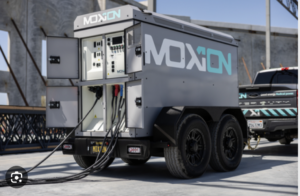The Helios is green inside and out
Article by Marjorie Galas for Resource411.com
Within the last decade, as many production companies and major networks began implementing “green initiatives” into their daily productions, David Rovsek, President of King Kong Production Vehicles, Inc, saw an area of production that was overlooked in the greening trend – the need for green vehicles.
He began drafting a concept for an eco-conscious production trailer as the economy slipped and the focus shifted from greening productions to keeping productions afloat. Despite the difficulties, Rovsek remained on the path that led to the April, 2011 launch of the Helios, the world’s first green production trailer.
“The economy took a big hit on the green initiative, but I’ve always been very green minded, and I continued to build the trailer because it was a growing need in the industry,” said Rovsek. “The resurgence is here now, and the response to the Helios was so great we’ve begun building our second one.”
As Rovsek began conceptualizing the trailer, he wanted to ensure he had a balance between two key factors: being green and being aesthetically pleasing. His first step was to research material that would be eco-conscious,durable, and visually compelling. He spent hours on the internet and visiting stores that specialize in green materials. Working with EnviroGlas, he was able to craft desk and counter-top surfaces that were light-weight, durable, and that were made out of post-consumer and post-industrial glass. Working with Lonseal, the flooring of the trailer is made from 50% post recycled content that is antimicrobial and contains low VOC’s (volatile organic compounds). The cabinets are made from bamboo, as well as the base of the couches, which are covered with a PVC-free faux leather surface.
“There’s also so much one can’t see,” said Rovsek. “For instance, we have used a soy-based insulation to reduce the need for heating or air conditioning.”
Crucial to Rovsek’s design were solar powered generators. The solar panels are placed on top of the vehicle, and can produce 2550 watts of continuous power that’s run through large banks of batteries. These batteries have a total of 41kwh that is fed to the trailer through pure sine wave invertors. While this wattage is enough to power an entire trailer, there is also a bio-diesel generator that can both run the trailer and supply power to the solar batteries if necessary.
“The solar generator has provided more energy than anyone thought it would,” said Rovsek. “On a two day commercial shoot the solar generator produced eighteen hours, where as the regular generator was used for only eight hours.”
The completed trailer has a production office, three hair and make up stations, a client lounge, a wardrobe, and two bathrooms. The production office is completely wireless, with dedicated phone lines and the capability to upload and download large digital files. The expected lifecycle of the trailers is fifteen to twenty years. As with all the King Kong trailers, a refurbishing of the interior occurs every six to eight years, or sooner if something needs replacing. While Rovsek’s fleet contains only one Helios trailer at this time, he is gradually greening his fleet, incorporating green materials into every trailer when upgrades are necessary.
“We wanted to get the Helios LEED certified, but it doesn’t qualify because it’s a moving vehicle,” said Rovsek. “This trailer is completely green and drop dead gorgeous. My wife said that the trailer is even better than our house!”


 Moxion and NUE
Moxion and NUE